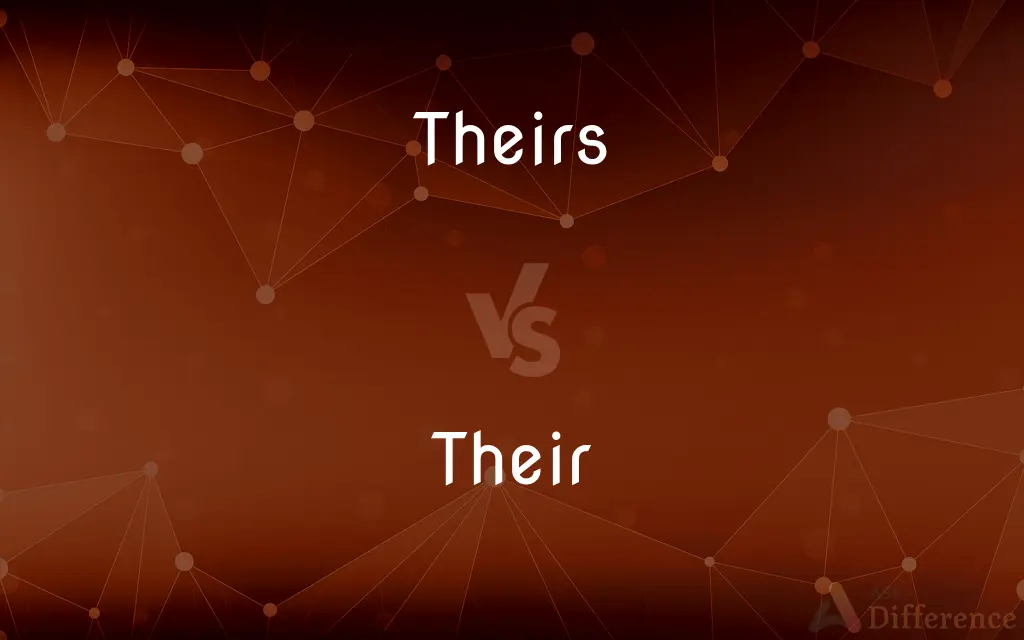Theirs vs. Their — What's the Difference?
By Urooj Arif & Maham Liaqat — Updated on March 17, 2024
Theirs also shows possession but is used without a noun following it. Their indicates possession and is used before a noun.

Difference Between Theirs and Their
Table of Contents
ADVERTISEMENT
Key Differences
The distinction between "theirs" and "their" primarily revolves around their grammatical roles and usage contexts. "Their" is a possessive adjective, used to describe something as belonging to or associated with the people or things previously mentioned or easily identified, while "theirs" is a possessive pronoun that stands in for a noun and indicates ownership by those people or things.
"Their" requires a noun to follow it in a sentence, specifying what exactly is being possessed or associated with the people. For example, in "their book," "their" describes who owns the book. On the other hand, "theirs" replaces the noun entirely and does not need a noun to follow it, such as in "The book is theirs." This eliminates the need to repeat the noun, making the sentence cleaner and more concise.
Usage of "their" and "theirs" is determined by the structure of the sentence. "Their" modifies a noun directly, which means it needs to be placed before the noun it's modifying. For instance, in "Their house is big," "their" modifies "house." Conversely, "theirs" is used to refer back to something already mentioned or understood, often at the end of a sentence or clause, as in "Is this pen theirs?"
Both "their" and "theirs" are inclusive, referring to belongings or associations with more than one person. The choice between them depends on whether the sentence already contains a noun to be modified (requiring "their") or whether the noun is omitted because it's implied or previously mentioned (requiring "theirs").
In terms of grammar and punctuation, "their" and "theirs" can both indicate possession but in slightly different contexts. "Their" is always followed by a noun or a noun phrase, whereas "theirs" stands alone, often followed by a verb or at the end of the sentence, demonstrating its function as a pronoun rather than an adjective.
ADVERTISEMENT
Comparison Chart
Part of Speech
Possessive Pronoun
Possessive Adjective
Requires a Following Noun
N0
Yes
Example
The book on the table is theirs.
Their book is on the table.
Usage in a Sentence
Used without a noun, often at the end of a sentence.
Used before a noun to indicate possession.
Indicates Possession For
People or things, replacing the noun entirely.
People or things mentioned previously.
Compare with Definitions
Theirs
A possessive pronoun used to indicate that something belongs to or is associated with certain people.
The choice was theirs to make.
Their
Implies a relationship or association with a group.
Their team won the championship.
Theirs
Emphasizes ownership or possession without specifying the object.
All of the responsibility is theirs.
Their
Indicates a connection to a particular place or thing.
Their homeland has a rich cultural heritage.
Theirs
Used to avoid repeating the noun already mentioned.
This is not our book; it's theirs.
Their
A possessive adjective indicating something belongs to or is associated with certain people or things.
Their house is just around the corner.
Theirs
Reflects a sense of belonging or entitlement.
The victory was theirs alone.
Their
Used to attribute ownership in a non-specific or general sense.
Their efforts were finally recognized.
Theirs
Can refer to people in general, not just a specific group.
The future is theirs for the taking.
Their
Reflects possession in a broad or abstract sense.
Their happiness is our top priority.
Theirs
Used to refer to a thing or things belonging to or associated with two or more people or things previously mentioned
A favourite game of theirs
They think everything is theirs
Their
Belonging to, from, of, or relating to, them (plural).
They will meet tomorrow at their convenience
This is probably their cat
Theirs
That which belongs to them; the possessive case of they, used without a following noun.
Their
Belonging to someone (one person, singular).
Their
Misspelling of there
Their
The possessive case of the personal pronoun they; as, their houses; their country.
Nothing but the name of zeal appears'Twixt our best actions and the worst of theirs.
Common Curiosities
Why would one use "theirs" instead of "their"?
To avoid repeating the noun already mentioned or when the noun is implied or understood from the context.
What is "their" used for?
"Their" is a possessive adjective used before a noun to indicate ownership or association by a group of people or things.
Is "their" only used for people?
No, "their" can refer to ownership or association with both people and objects.
What is the role of "theirs" in a sentence?
"Theirs" functions as a pronoun, replacing the noun and indicating possession, often at the end of a sentence.
Can "their" and "theirs" be used interchangeably?
No, because "their" requires a noun to follow it, while "theirs" replaces the noun and stands alone.
How does the use of "their" affect sentence structure?
"Their" precedes a noun, acting as an adjective to modify the noun by indicating possession.
Can "their" be used for abstract concepts?
Yes, "their" can indicate association with abstract concepts, such as "their happiness" or "their beliefs."
How is "theirs" different from "their"?
"Theirs" is a possessive pronoun that indicates ownership and is used without a following noun, unlike "their."
In what contexts is "their" most commonly used?
"Their" is commonly used to show possession in sentences where the object owned or associated is mentioned directly.
Can "theirs" refer to something owned by a single person?
Typically, "theirs" refers to ownership by a group, but it can be used for a single person in contexts where the gender of the person is not specified.
Where does "theirs" fit in sentence construction?
"Theirs" usually comes at the end of a sentence or clause, indicating ownership without repeating the noun.
How does one choose between using "their" and "theirs"?
The choice depends on whether a noun follows the possessive (use "their") or if the noun is omitted because it's understood or already mentioned (use "theirs").
Can "their" indicate temporary possession?
Yes, "their" can indicate temporary possession, as in "Their rental car is parked outside."
Do "their" and "theirs" have singular forms?
No, both "their" and "theirs" are used for both singular and plural referents when the gender is not specified, but they do not change form based on number.
Is "theirs" formal or informal?
"Theirs" is neutral and can be used in both formal and informal contexts.
Share Your Discovery

Previous Comparison
Categorise vs. Categorize
Next Comparison
Statistic vs. StatisticsAuthor Spotlight
Written by
Urooj ArifUrooj is a skilled content writer at Ask Difference, known for her exceptional ability to simplify complex topics into engaging and informative content. With a passion for research and a flair for clear, concise writing, she consistently delivers articles that resonate with our diverse audience.
Co-written by
Maham Liaqat














































